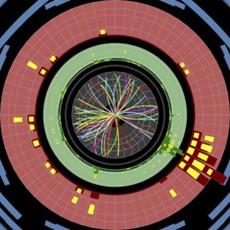New announcement on Higgs Boson experiment expected next week
10 Dec 2011
An international team of researchers that has been smashing high-energy protons together inside the Large Hadron Collider (LHC) at CERN to re-create the conditions at the time of the Big Bang leading to the creation of universe are expected to announce new results on 13 December in Geneva regarding their search for the Higgs Boson particle.
 |
| Simulated production of a Higgs event in ATLAS. |
The Higgs Boson is a hypothetical massive elementary particle that is predicted to exist by the Standard Model of particle physics.
The Standard model has been the basis of particle physics for more than 30 years and describes the forces between the particles of matter. The Higgs Boson is the missing ingredient in the model that has been hypothesised to explain the existence of mass in the universe.
University of Liverpool's contribution to these detectors was delivered using the Liverpool Semiconductor Detector Centre and Physics Workshops which are central to the Particle Physics Programme.
The team is now involved in analysing the results from the LHC - the world's highest energy particle accelerator. The LHC works by accelerating two beams of protons to almost the speed of light. The protons collide together 40 million times a second, recreating the conditions of the universe immediately after the Big Bang, and enabling scientists to reconstruct fundamental particles produced at that time.
A group of University of Toronto high-energy physicists, along with their 3,000 researchers from 38 countries involved in the ATLAS particle physics experiment at the Large Hadron Collider, have played a leading role in the hunt for the Higgs. The ATLAS detector, a key component of which was built at University of Toronto, was designed to search for new particles in the highest mass collisions of high-energy protons in the LHC.



















